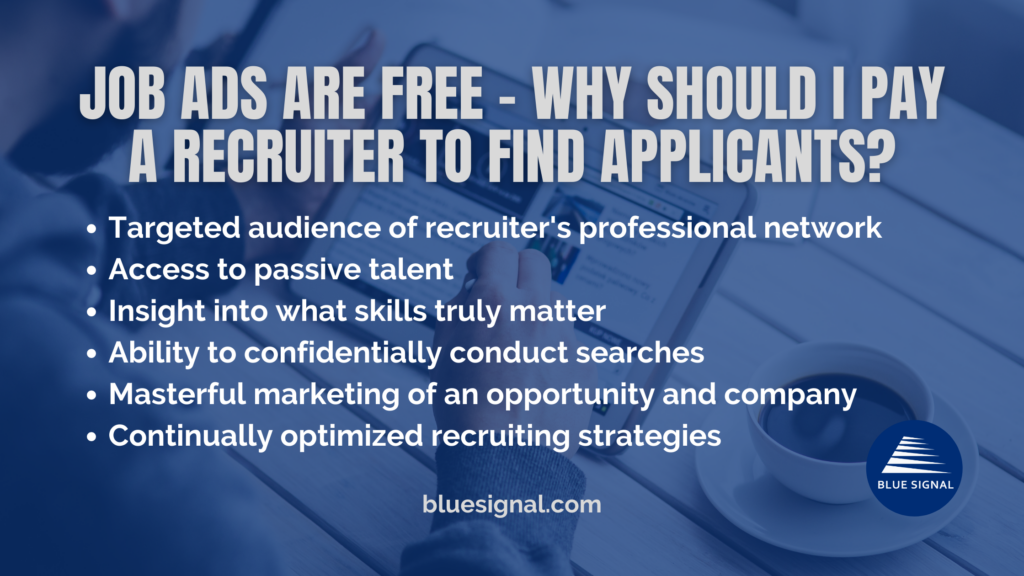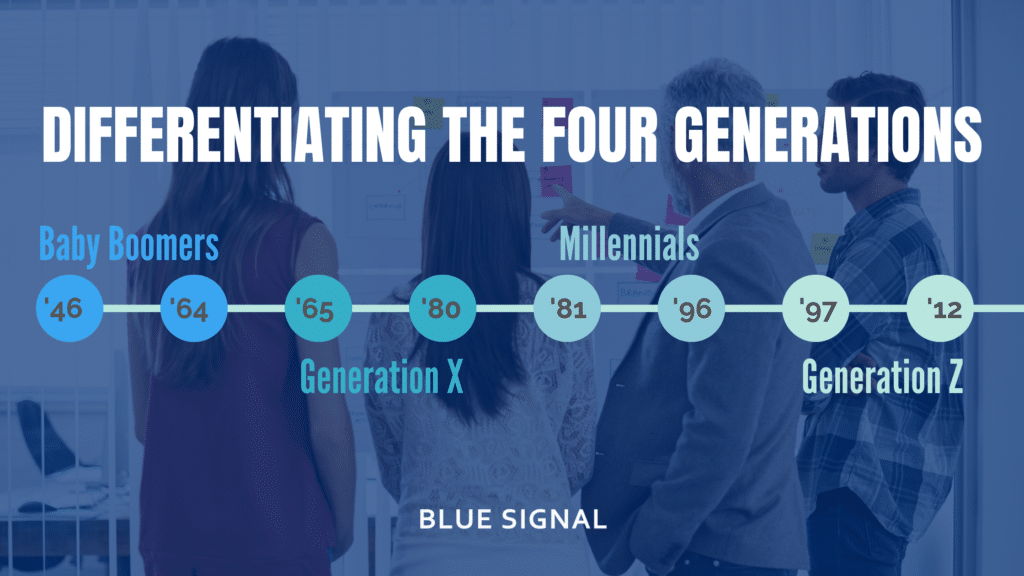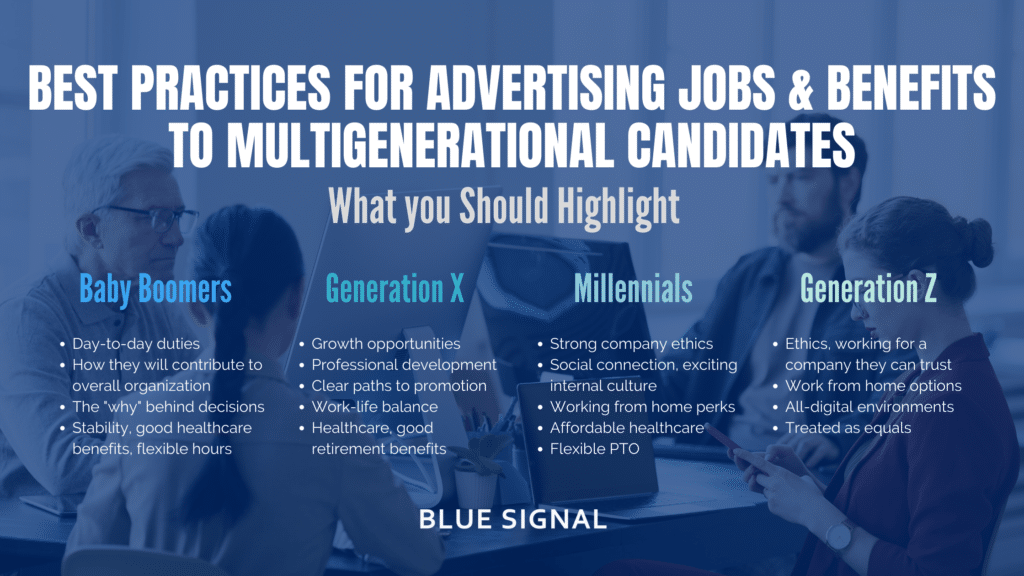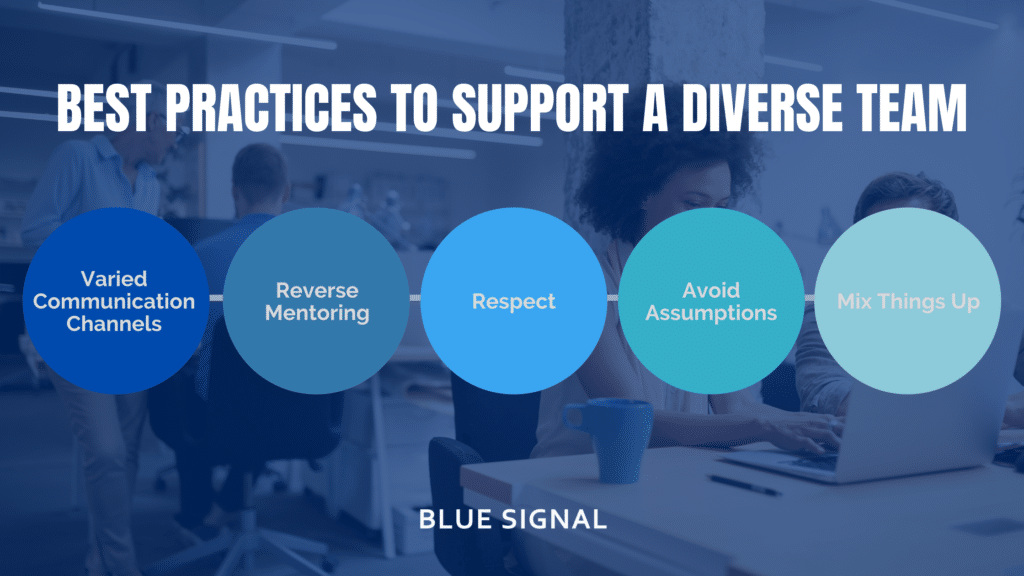Addressing Common Misconceptions About the Value of Talent Acquisition in the Hiring Process
It’s Q1 and you’re working with a new hiring budget for the year. You have a lot of hires you need to make, and may be overwhelmed with the state of the market. Maybe you’ve considered engaging with a talent agency – but you’re uneasy. You’re asking yourself, are executive recruiters worth it? You want to protect your money, but also your time. You’re nervous about the transactional stereotypes surrounding bad recruiters, and are hesitant to take the leap.
All of these common questions and concerns are totally reasonable. Being curious and calculated is just good business! Let Blue Signal set the record straight and help you determine if hiring a recruiter would make the most sense for your current search.
Job Ads Are Free – Why Should I Pay a Recruiter to Find Applicants?
Chances are you’ve posted your open role online somewhere. Your results are mixed – and you’re either getting flooded with ill-fitting candidates or have received next to no applicants. You wrote the job description to the best of your ability and are stuck. You’re left wondering how paying a recruiter to “do the same thing” will help.

This is one of the biggest misconceptions when it comes to recruiting. Executive recruiters are able to add value to a search even before sending you resumes. Successful professionals leverage relationships with recruiting firms to stay on top of their industry, and gain insight into the market before it changes. By employing a specialized recruiter in your industry niche, their social media following and network of professionals gets your open req in front of the right audience at the onset.
Simply put, leveraging a recruiter when advertising a role ensures access to their fine-tuned network of professionals. Talent acquisition firms are built on applicant tracking systems (ATS), and take years to properly build out. With this log of qualified talent, working with a recruiter gives you access to both active talent – or applicants looking to make a move – as well as passive talent, i.e. people who aren’t necessarily looking for a job change.
Passive talent is usually succeeding in their current role today, giving you access to top performers that you may have otherwise missed. Additionally, recruiters have the experience and insights needed to help separate the value from the fluff. For example, specialized IT recruiters know what certifications will help you in your modernization and business transformation journeys, and HR recruiters will know what certs are needed to keep those projects all on track. They’ll be able to judge resumes and CVs accordingly, and only send you the best of the best.
Perhaps you know what you are looking for but are unable to advertise a role or target the candidates you truly want. By leveraging a recruiter, you are able to confidentially conduct searches and have a middleman representative between you and competitors in your space. This opens doors to more hiring possibilities! By allowing a recruiter to market your role, you’re keeping your reputation intact among your own customers and peers.
In fact, marketing a role is half the battle. Executive recruiters are master marketers, and know how to best sell a candidate on an opportunity and employer. Because talent acquisition is a fine balance between B2B and B2C sales, recruiters know just how to address the wants and needs of their B2C clientele. The candidate experience is just as important to your own process when hiring in a candidate-driven market, and recruiters are trained to navigate it daily. They will deploy different strategies – attracting particular industries, professions, even generations – to get you the candidate you need.
Moreover, the talent acquisition world is changing daily. Executive recruiters have access to and are constantly working to master new technology in this space, especially as it surrounds job ads and applicant tracking. Artificial intelligence (AI), machine learning (ML), and automation are making an impact within talent acquisition just like every other industry. As the digital landscape of recruiting continues to evolve, recruiters will play a key role in supporting their clients as they learn new technologies, counteroffer techniques, and recruiting strategies to keep them ahead in the 2020s.
Okay, But I Can Screen Applicants – Why Should I Have a Recruiter Interview My Candidates?
Interviewing applicants is much more involved than a 30-minute phone call. Recruiters can help you manage all the moving parts. They will screen CVs and conduct the initial candidate intake for you, ensuring that the candidates that make it onto your calendar are prequalified for the position. Then, they offer support through the entire process – including interview coordination, reference checks, candidate management, and salary negotiations. Executive recruiters act as project managers throughout the interview process, prioritizing success for all involved.

With candidate retention guarantees, it doesn’t benefit a recruiter to make a match that won’t work and then in turn, have to start the process over. Recruiters are invested – and your success is their success! When leveraging a recruiting firm with placement guarantees, you protect your investment for the first 12 months of their employment.
However, you’ll never make a hire from an executive recruiter without determining fit for yourself. A recruiter can help there, too! Executive recruiters know what questions to ask to uncover information, and can help coach you through the interview process.
Understandably, candidates tend to open up to recruiters differently than they would to a potential employer. With information coming from a 3rd party, they may trust recruiters’ input more than information coming straight from an employer, too. Because executive recruiters also represent the candidates’ best interests in the hiring process, they are able to uncover the candidate’s true drivers, must-haves, and qualifications. Whether it’s supporting long-term career goals, aligning core values, or negotiating pay – a recruiter can properly suss out a candidate’s needs.
Let’s use the compensation example. To be considered for the role, a candidate may feel like they have to give hiring managers an agreeable answer, rather than being forthcoming about their true financial needs. Alternately, they will tell recruiters their honest salary expectations and a recruiter can represent them accordingly. If they are out of your budget, they can move on with no time wasted. If they are, both parties can move forward knowing that they are well matched while maintaining traditional interview etiquette. No more losing out on candidates at the final offer stage!
That Does Sound Promising, But Why Do Executive Recruiters Cost So Much?
It does seem counterintuitive to save money by spending it to bring another party into the hiring process – but the proof is in the results. So much so that most executive recruiters will actually work for free, and will only bill you once a placement has been made. Let’s break down that value-add.

The majority of hiring managers are not solely responsible for hiring. Because of their normal duties, how much time are they feasibly able to contribute to the hiring process? And how much does that hinder their official responsibilities? In 2020, upper management and C-suite positions took 20% of companies more than 3 months to hire. In one study, 67% of respondents said it takes between 30 minutes to 2 hours just to schedule one interview. To cover for an absence in the team, write and post a job description, review applicants, schedule interviews, conduct interviews, and to actually make a hire can take up approximately 100 hours of a hiring manager’s time per hire. Meanwhile, a recruiter’s entire 9-5 is devoted to a search. This can reduce your team’s time spent by about 70%.
Additionally, hiring a recruiter can offer exponential cost savings. 76% of hiring managers admit to recruiting the wrong candidate for a role, essentially making at least one bad hire per year. According to the US Department of Labor, the average cost of a bad hire is up to 30% of the employee’s first year compensation. This can result in as much as $240K depending on the role and company. When you also consider a 12-month placement guarantee, a recruiter fee seems like a fair investment to ensure your new hire pans out. Employing a recruiter helps lessen your chance of a costly bad hire.
Finally, a recruiter’s expertise offers immeasurable value in a search. As experts in your industry niche, they will be able to provide insights into the market and your competitors’ movements that you won’t find online. They can define typical salary ranges for roles spanning several industries, locations, job functions, and skill levels. As hiring professionals, they are constantly in the business of knowing what companies are hiring, what companies are losing talent, and why. Executive recruiters are able to represent candidates without you “poaching” from your network, allowing access to otherwise unobtainable talent. The list goes on and on.
Ultimately, Why Should I Work with a Recruiter?
As a 30-second elevator pitch, we could talk about how executive recruiters help you save time and money. However, the real value comes from what executive recruiters bring to overall business strategy. They can help inform you about your industry’s movements, what your competitors are doing when it comes to hiring, trends you should be aware of, and changes in the market you should prepare for. Successful recruiters provide companies with more than a warm body for an open job.

When considering whether or not to take a recruiter’s call, consider the value of a long-term partner. A good recruiter will help advise you no matter how long it’s been since a placement was made. Having access to these insights is just good business, even when you’re not actively hiring. Recruiters share their clients’ successes, and are passionate about making these matches. After all, recruiters change organizations – as well as people’s lives and careers! – for the better.
When it comes to selecting a recruiter, make sure to engage with relationship-based recruiters that are invested in the future of your company. At Blue Signal, we’ve set out to disprove the bad industry reputation that has resulted from transactional recruiting methods. As your partner in the process, we hope to make a long-lasting connection that benefits your organization beyond filling a role.



